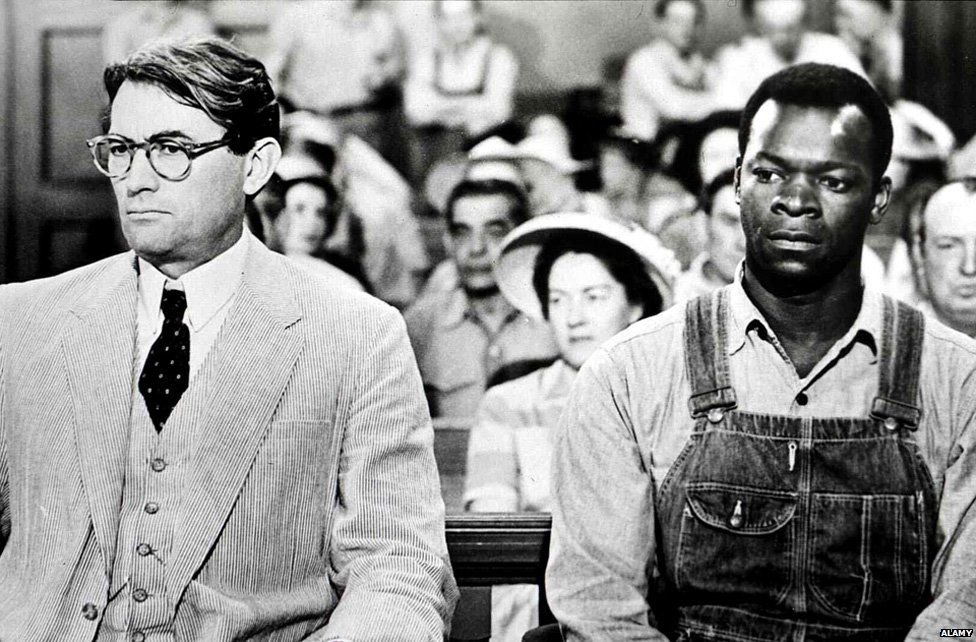Do people become more prejudiced as they grow older?
- Published

Admirers of Harper Lee's classic novel To Kill a Mockingbird have been shocked by the transformation of the lawyer Atticus Finch into a racist in the newly published Go Set a Watchman, set 20 years later. But psychologist William von Hippel says it should not necessarily be a surprise - he argues that it's not unusual for people to become more prejudiced as they get older. This article contains language that some readers might find offensive.
Atticus may be fictional, but his transition from the lone defender of an unjustly accused African American in To Kill a Mockingbird to a 72-year-old who resists school desegregation in Go Set a Watchman is all too real.
My research suggests that, although many people remain unprejudiced throughout their lives, older adults have a tendency to be more prejudiced than their younger counterparts.
Psychologists used to believe that greater prejudice among older adults was due to the fact that older people grew up in less egalitarian times. In contrast to this view, we have gathered evidence that normal changes to the brain in late adulthood can lead to greater prejudice among older adults.
The frontal lobes are the last part of the brain to develop as we progress through childhood and adolescence, and the first part of the brain to atrophy as we age. Atrophy of the frontal lobes does not diminish intelligence, but it degrades brain areas responsible for inhibiting irrelevant or inappropriate thoughts. Research suggests that this is why older adults have greater difficulty finding the word they're looking for - and why there is a greater likelihood of them voicing ideas they would have previously suppressed.
Famous people are at a disadvantage when their frontal lobes start to shrink, as many of their utterances are part of the public record. But disinhibition is also costly for people outside the public eye. When I was teaching at Williams College in Massachusetts, an African-American student told me how her white grandfather had recently started referring to her as his "little nigger grandchild". She was shocked and hurt by this, and couldn't understand why her grandfather would say such a thing when she knew he loved her and was still mentally alert. The consequences of his disinhibited words were substantial, although he was creating friction only with family and friends.
In our research we have found evidence of a variety of problems of this kind. For example, older adults in our experiments are more likely than younger adults to rely on stereotypes and they have more difficulty than younger adults suppressing their stereotypic thoughts. But it doesn't stop there - we find that older adults are more likely to be socially insensitive across a variety of domains. Furthermore, all of these effects only emerge among older adults who show signs of poor frontal lobe functioning.
There are two ways of interpreting the disinhibited expressions of older adults. Perhaps such statements reveal people's true personality, finally emerging now that they can no longer suppress their beliefs? In other words, strip away the political correctness enabled by the frontal lobes, and you learn what my student's grandfather had really been thinking all these years.
Alternatively, it may be the case that our inhibitory abilities don't suppress our personality but rather help shape it.
In my primary school in Anchorage, Alaska, some of the children used to shove snow down the jacket of a boy who had muscular dystrophy, because his physical disability prevented him from protecting himself. My guess is that these children grew into adults who truly believe it is morally reprehensible to torment disabled children, but I also suspect that my former classmates now rely on their inhibitory ability to keep their earlier and more primitive attitudes in check. From this perspective, inhibitory ability isn't stopping people's true opinions from emerging so much as it's suppressing their prior opinions. Our research indicates that older adults simply have greater difficulty suppressing prejudices than younger adults do.
To return to Atticus Finch, it does indeed seem that some older adults start to show prejudice even if they never did before. Such changes in social attitudes are not inevitable, but they are common. And the people who find themselves becoming less tolerant or more prejudiced can be quite unsettled by the shift in their own attitudes - a change that can affect friendships and their position in society.
William von Hippel is Professor of Psychology at the University of Queensland, Australia.
Read William von Hippel's research in more detail:
Age, Race, and Implicit Prejudice in Psychological Science
Aging, Inhibition, and Social Inappropriateness and Social Inappropriateness, Executive Control, and Aging in Psychology and Aging
Stereotype Activation, Inhibition, and Aging in the Journal of Experimental Psychology
Stereotyping Against Your Will: The Role of Inhibitory Ability in Stereotyping and Prejudice among the Elderly in Personal and Social Psychology Bulletin
More from the Magazine
Is mental infirmity an inevitable consequence of getting old? Peter Bowes investigates whether brain training can help someone's mind stay young, or have an impact on age-related diseases.
Subscribe to the BBC News Magazine's email newsletter to get articles sent to your inbox.